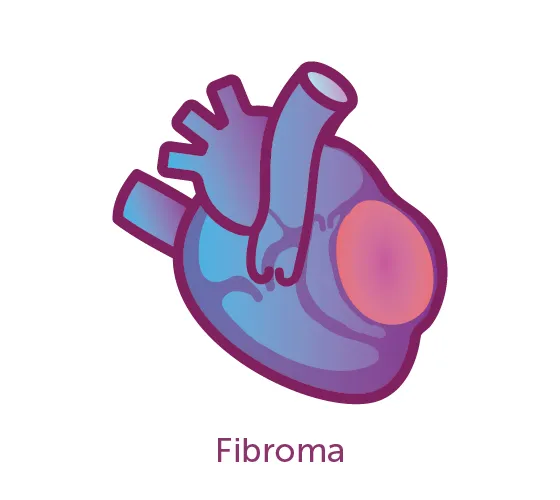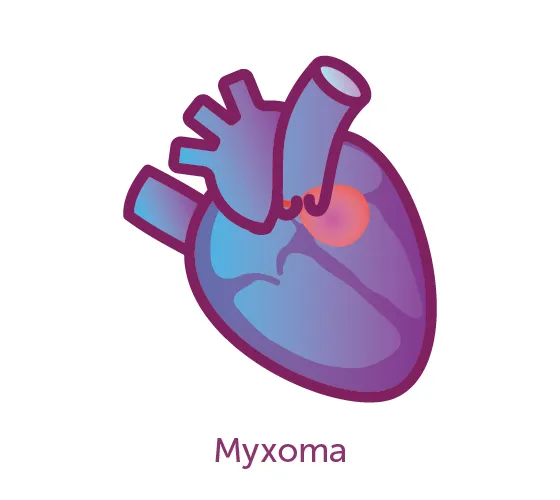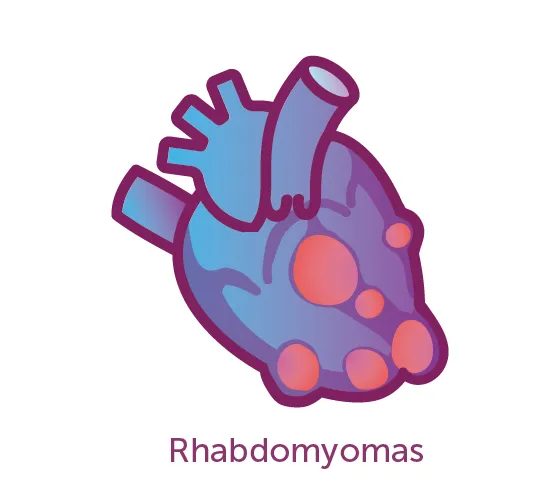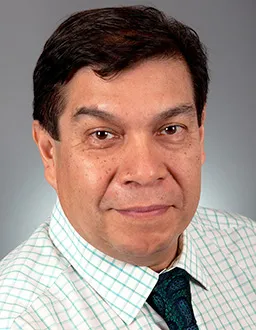Breadcrumb
- Home
- Conditions & Treatments
- Heart Tumor
What is a heart tumor?
A heart tumor, or cardiac tumor, is a rare, abnormal growth that develops in the heart. Heart tumors can occur in any location, such as on the valves, within the heart muscle, inside a chamber, or around the heart. Most heart tumors in children are benign, meaning they are non-cancerous, and unlikely to spread to other organs. However, even benign tumors can be life threatening if they cause problems with blood circulation or cause an abnormal heart rhythm.
What is the difference between a tumor and a mass?
A cardiac mass is a general description of a lump of tissue found in the heart. The mass could be caused by a tumor or something that is not a tumor. A tumor is specifically caused by an abnormal growth of cells. A mass that is not a tumor could be from a variety of causes, such as a malformed structure, or pooling of blood cells within a section of the heart.



Are there different types of heart tumors?
There are many types of heart tumors in children. The most common are rhabdomyomas and fibromas. Most are benign, meaning they are not cancer. In rare cases (fewer than 1 percent), heart tumors are cancerous. The table below describes the percentages of each tumor type seen at Boston Children's.
Name of heart tumor | Percent of all tumors |
|---|---|
Rhabdomymas | 61% |
Fibromas | 14% |
Myxoma | 8% |
Hemangioma | 3% |
Intrapericardial teratoma | 2% |
Lipoma | 2% |
Other | 9% |
Malignant (cancerous) | fewer than 1% |
Total | 100% |
Symptoms & Causes
What are the symptoms of a heart tumor?
What are the symptoms of a heart tumor?
Most children with heart tumors have no symptoms. But for those who do, the heart tumor symptoms often imitate those of other heart conditions. This can make them a challenge to diagnose. Depending on the tumor location, size, and growth rate, children may have:
- Heart failure
- Heart murmurs
- Palpitations, rapid heart rate, or arrhythmia
- Shortness of breath or difficulty breathing
- Breathing problems when changing positions or lying flat
- Dizziness, lightheadedness, or fainting
- Chest pain or chest tightness
What causes heart tumors?
Causes of heart tumors vary. For the most part, heart tumors are believed to be the result of abnormal growth of heart tissue cells. A small percentage of tumors are genetically inherited, which can be found with genetic testing. In most cases, tumors develop without any family history.
Diagnosis & Treatments
How are heart tumors diagnosed?
Heart tumors often begin growing even before a child is born. It is often possible to detect tumors early, sometimes as soon as 20 weeks into the pregnancy, by using diagnostic tools such as fetal ultrasound. However, some tumors may not be discovered until later in pregnancy or after birth.
Since heart tumors often mimic symptoms of more common conditions, diagnosis requires imaging the heart. Your child’s doctor may use one or more of the following tests to diagnose a heart tumor:
- Echocardiogram (ultrasound of the heart): Sound waves pass through the chest to create an image of the heart, outline the tumor and evaluate blood flow
- Cardiovascular MRI: Evaluates the structure and function of the heart and blood vessels and determine the type of tumor
- Cardiac CT: Used to visualize the heart, blood vessels and lungs
- Chest X-ray: May show abnormalities that lead to detailed cardiac imaging
- Cardiac catheterization: Evaluates blockage of blood flow from the tumor and coronary arteries
- Electrocardiogram (ECG or EKG): Measures the electrical activity of the heart and evaluates for arrhythmia
- Holter monitor: Measures the rhythm of the heart and evaluates for an arrhythmia
My child was diagnosed with a heart tumor. What questions should I ask my doctor?
Below are some key questions to ask your doctor:
- Is there only one tumor in the heart, or more than one?
- Is the tumor inside the heart or around the heart?
- Is the tumor causing any problems with blood flow?
- Do you know what type of tumor it is?
- What is the chance the tumor is cancerous?
- Would a cardiac MRI or CT help evaluate the tumor?
- Should my child have additional testing to look for a heart rhythm abnormality?
- Is there a possibility my child has a genetic abnormality that is associated with this type of tumor? If so, should my child see a specialist in genetics?
- What is the recommended treatment for the tumor? Could it be biopsied or removed?
- What is the long-term outlook for my child?
How are benign heart tumors treated?
Benign (non cancerous) cardiac tumors are often very large. This can cause compression of vital cardiac structures in the heart and obstruct blood flow. Most heart tumors are treated with surgery, but treatment options may depend on the size, location, and type of the tumor as well as the child’s heart function.
Removing a heart tumor usually requires open-heart surgery. During the procedure, the surgeon will remove the tumor and some of the surrounding tissue from the heart. Then they will preform any necessary repairs or reconstruction to make sure the heart functions properly.
How are malignant heart tumors treated?
Treatment for malignant (cancerous) heart tumors often includes radiation, chemotherapy, and management of symptoms. In some cases, surgery or heart transplantation may be a treatment option.
Can heart tumors be cured?
Most benign heart tumors can be managed effectively in children so that they are able to live long, healthy lives. Whether or not a child can be cured depends on the type of the tumor, as well as where it is located and how large it has grown. For example, rhabdomyomas will generally shrink in size over time and rarely cause issues in older children and adults. Other tumors, such as intrapericardial teratomas and myxomas, can often be completely removed with surgery.
How we care for heart tumors
The Boston Children’s Hospital Heart Tumor Program has one of the most accomplished teams of cardiologists and cardiac surgeons in the field of managing cardiac tumors in children. Our expertise in diagnosis and treatment leads to better surgical interventions and arrhythmia management for the best possible outcomes.





